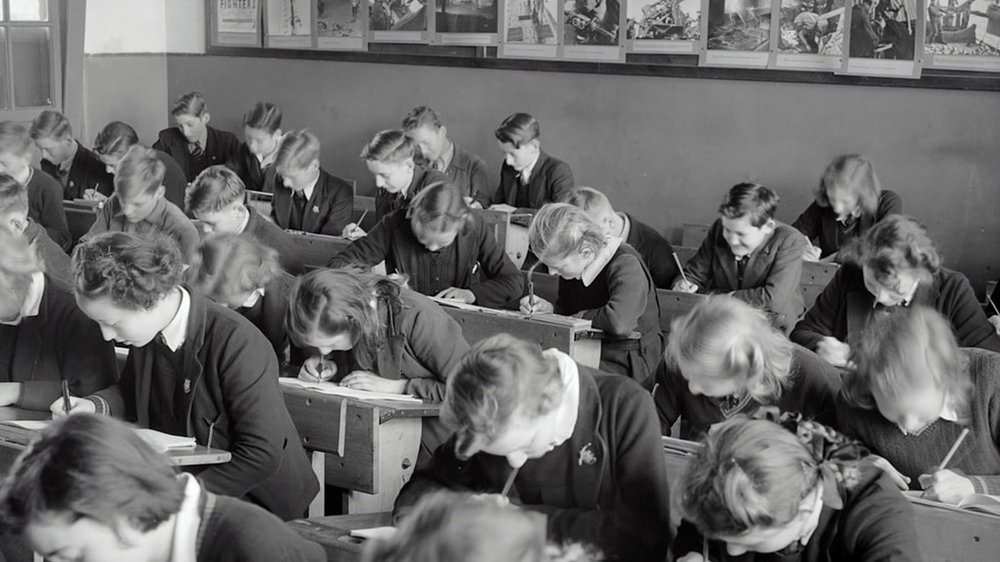I remember hearing this question spoken in an interview about five years ago, and it almost knocked me out of my chair.
Having grown up in public school, attended a state institution of higher learning and written about the traditional public school world for a large chunk of my career, my visceral response to this question was a resounding, Yes, of course, why would you even ask such an absurd question.
Like most people in America who attended traditional public schools and a state college, I was very sure I knew what school was for, and what it was supposed to look like, feel like, smell like.
And even though I am degreed and literate and a student of the game, I am still thoroughly influenced by my school experience. Hey, it worked for me and the world in which I lived (at the time). And look how wonderful I turned out.
But let’s be real for a second. I grew up in a very different world. I am in my 60s. My world was Mad Men and Bewitched and Sean Connery as Bond. When I was in school, a computer took up an entire wall and had significantly less computing power than the Samsung that I carry around in my pocket.
My school experience had absolutely nothing to do with today’s world. It was a joke by today’s standards. We used to sit in classes for 55 minutes at a time, for the privilege of hearing what a teacher knew about a given subject. A bell would ring, and we would repeat in another classroom, listening to what another teacher knew about another subject. It was all pretty mundane, and if you had one of those classes that followed a textbook, you could read the textbook ahead of time and the class became unnecessary.
But back in my school days, let’s call them the olden days, we had some magnificent teachers. And those teachers were in love with teaching, and really cared about their students. In 7th grade science class, we would all walk down to the creek and pick up rocks when we studied geology. We would look at the stratifications. What kind of heat and pressure would it take to create those rocks? When we studied astronomy, our moms would drive us to school in the evening at dark, and there would be a telescope set up.
We took a field trip to Washington DC to learn about government. We got to go into the Capitol Building and sit in the Gallery. We went to the Bureau of Printing and Engraving. We visited the Lincoln Memorial.
The wonderful thing about school in the olden days wasn’t hearing what the teacher knew about a given subject. It was the wonderment of learning new things. It was using your imagination, and then learning to fill in the gaps. Learning was exciting. The closest thing we had to Google was an encyclopedia. And the library. The world used to be a magical place. You didn’t have the knowledge of the world at your fingertips. You had to work for the answers. And when you got the answers you were seeking, there was no small amount of joy and satisfaction involved.
The good news today is that teachers don’t have to be the centers of all knowledge. And just like before, teachers can create a world of wonderment. And even though today every kid has the sum total of the world’s knowledge at their fingertips, it is still possible for teachers to ask questions to excite young minds. And with today’s technology, a trip to Washington is just a click away.
When I was nine, we went to the Smithsonian; it was so massive, we spent days there. To a nine-year-old, the 90-foot blue whale suspended from the ceiling looked tremendous. I can only imagine seeing it through virtual reality.
So back to my original question, is school necessary?
Yes and no. Today, school is quite literally what we make it. The school experience can be an amazing thing for young minds. Of course, it is no longer dependent on geography. In many cases, it may make sense for school to be a few days at home and a few days at a central location. There is a lot to be said for the excitement of learning together with others who have similar interests. Young minds need a good bit of structure along with room to imagine, so some form of traditional school may make a lot of sense. But traditional school is changing rapidly. In the next few years, even traditional schooling won’t look like traditional schooling. There will be some whole group learning, some small group learning, some individual projects, and a whole lot of as-needed teaching delivered from on-location teachers as well as off-location teachers.
The experience will change – for the better.
With the tools that schools have access to, there is no home-schooling experience in the world that could compete. Frankly, most traditional schools aren’t there yet. But they will be.
So have faith.
In coming years, the traditional school experience will be amazing. It will be exciting, and at times, breathtaking. Entre into schools of ed will be very competitive, and the profession of teaching will be fun and rewarding.
In our lifetimes, and probably our children’s lifetimes, schools will still exist and will still be deemed necessary. But the definition of school will be very different.
When school as we know it first started, it wasn’t necessary so much as it was a privilege. And it will be again. Learning to read and write and perform mathematics will be something every child can acquire at home by the time they are eight years old. But the experience…
That will be another story entirely.
About the author

Charles Sosnik is an education journalist and editor and serves as Editor in Chief at the Learning Counsel. An EP3 Education Fellow, he uses his deep roots in the education community to add context to the education narrative. Charles is a frequent writer and columnist for some of the most influential media in education, including the Learning Counsel, EdNews Daily, EdTech Digest and edCircuit. Unabashedly Southern, Charles likes to say he is an editor by trade and Southern by the Grace of God.










